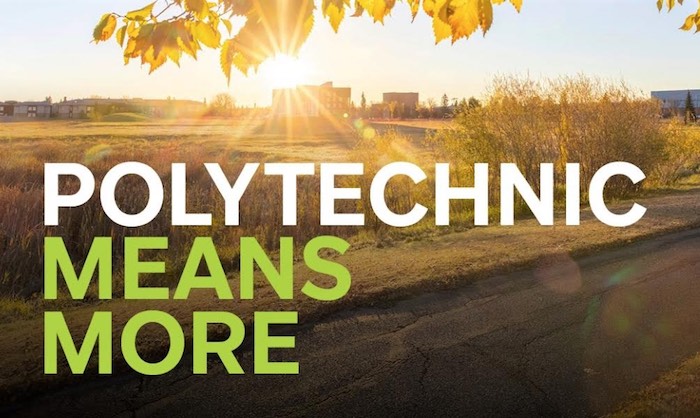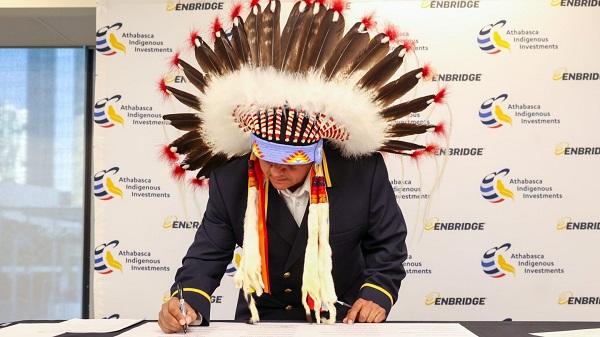Alberta
Red Deer Polytechnic Means More for Students, Industry and Communities across Alberta

Red Deer Polytechnic (RDP) is highlighting its unique programs, hands-on training and applied research through a new “Polytechnic Means More” campaign. With more ways to learn and more industry connections, Red Deer Polytechnic provides its students with more opportunities to attain rewarding careers.
“Within a polytechnic model, our students receive outstanding learning experiences, focused on where industry is going, and the innovations required to get there. Through this campaign, our learners share their experiences about Red Deer Polytechnic’s impact,” says Stuart Cullum, President of Red Deer Polytechnic.
Brett Lower, a current Bachelor of Science Nursing student and member of the Kings Volleyball team, is one of the students profiled in the campaign. When he was considering post-secondary education after graduating from Lindsay Thurber High School in Red Deer, he wanted to attend an innovative institution that offered program excellence, technology integration, experiential learning opportunities, positive connections, and a strong athletics program. That led him to Red Deer Polytechnic.
The “Polytechnic Means More” campaign also highlights how applied research benefits students. By collaborating to solve complex social, technical and business challenges with industry, community partners, entrepreneurs and other stakeholders, RDP students are gaining the skills and competencies needed for their success in work and life.
“The ‘Polytechnic Means More’ campaign will be shared in a variety of ways across Alberta during the next six months. We’re excited for this opportunity to engage with people across the province as we share more about our institution’s impact,” says Richard Longtin, Vice President, External Relations.
Red Deer Polytechnic is proudly rooted in central Alberta, while making an impact across the province and around the world.
“As a polytechnic institution, we will continue to leverage our regional strengths to create a bigger and broader impact across the province, nationally and around the world. We are strongly positioned to respond to the needs of learners, industry and communities to align with the economic and social priorities of Alberta,” says Cullum.
Additional information about the “Polytechnic Means More” campaign is available online.
About Red Deer Polytechnic: This post-secondary institution’s story began in 1964, as Red Deer College. Focused on the economic and social interests of Alberta, Red Deer Polytechnic proudly serves a community of learners through a diverse and growing number of industry relevant programs across a breadth of credentials.
These credentials include degrees, diplomas, certificates, apprenticeship training, micro-credentials, camps and workshops, and more, to thousands of youth and adult learners across our region. With modern teaching and learning spaces, and state-of-the-art research and innovation centres in advanced manufacturing and energy innovation, the Polytechnic provides applied research opportunities, leadership in the social, economic and cultural development of Alberta, and myriad lifelong learning opportunities.
Red Deer Polytechnic estimates that about 6,300 full-and part-time credit, collaborative and apprenticeships students will enroll for the 2022/2023 academic year, in addition to more than 3,000 learners within Extended Education programming. Red Deer Polytechnic’s main campus is located on Treaty 7, Treaty 6 and Métis ancestral lands. This is where we will strive to honour and transform our relationships with one another.
For more information, please visit: rdpolytech.ca | twitter | facebook | instagram
Alberta
Made in Alberta! Province makes it easier to support local products with Buy Local program

Show your Alberta side. Buy Local. |
When the going gets tough, Albertans stick together. That’s why Alberta’s government is launching a new campaign to benefit hard-working Albertans.
Global uncertainty is threatening the livelihoods of hard-working Alberta farmers, ranchers, processors and their families. The ‘Buy Local’ campaign, recently launched by Alberta’s government, encourages consumers to eat, drink and buy local to show our unified support for the province’s agriculture and food industry.
The government’s ‘Buy Local’ campaign encourages consumers to buy products from Alberta’s hard-working farmers, ranchers and food processors that produce safe, nutritious food for Albertans, Canadians and the world.
“It’s time to let these hard-working Albertans know we have their back. Now, more than ever, we need to shop local and buy made-in-Alberta products. The next time you are grocery shopping or go out for dinner or a drink with your friends or family, support local to demonstrate your Alberta pride. We are pleased tariffs don’t impact the ag industry right now and will keep advocating for our ag industry.”
Alberta’s government supports consumer choice. We are providing tools to help folks easily identify Alberta- and Canadian-made foods and products. Choosing local products keeps Albertans’ hard-earned dollars in our province. Whether it is farm-fresh vegetables, potatoes, honey, craft beer, frozen food or our world-renowned beef, Alberta has an abundance of fresh foods produced right on our doorstep.
Quick facts
- This summer, Albertans can support local at more than 150 farmers’ markets across the province and meet the folks who make, bake and grow our food.
- In March 2023, the Alberta government launched the ‘Made in Alberta’ voluntary food and beverage labelling program to support local agriculture and food sectors.
- Through direct connections with processors, the program has created the momentum to continue expanding consumer awareness about the ‘Made in Alberta’ label to help shoppers quickly identify foods and beverages produced in our province.
- Made in Alberta product catalogue website
Related information
Alberta
Province to expand services provided by Alberta Sheriffs: New policing option for municipalities

Expanding municipal police service options |
Proposed amendments would help ensure Alberta’s evolving public safety needs are met while also giving municipalities more options for local policing.
As first announced with the introduction of the Public Safety Statutes Amendment Act, 2024, Alberta’s government is considering creating a new independent agency police service to assume the police-like duties currently performed by Alberta Sheriffs. If passed, Bill 49 would lay additional groundwork for the new police service.
Proposed amendments to the Police Act recognize the unique challenges faced by different communities and seek to empower local governments to adopt strategies that effectively respond to their specific safety concerns, enhancing overall public safety across the province.
If passed, Bill 49 would specify that the new agency would be a Crown corporation with an independent board of directors to oversee its day-to-day operations. The new agency would be operationally independent from the government, consistent with all police services in Alberta. Unlike the Alberta Sheriffs, officers in the new police service would be directly employed by the police service rather than by the government.
“With this bill, we are taking the necessary steps to address the unique public safety concerns in communities across Alberta. As we work towards creating an independent agency police service, we are providing an essential component of Alberta’s police framework for years to come. Our aim is for the new agency is to ensure that Albertans are safe in their communities and receive the best possible service when they need it most.”
Additional amendments would allow municipalities to select the new agency as their local police service once it becomes fully operational and the necessary standards, capacity and frameworks are in place. Alberta’s government is committed to ensuring the new agency works collaboratively with all police services to meet the province’s evolving public safety needs and improve law enforcement response times, particularly in rural communities. While the RCMP would remain the official provincial police service, municipalities would have a new option for their local policing needs.
Once established, the agency would strengthen Alberta’s existing policing model and complement the province’s current police services, which include the RCMP, Indigenous police services and municipal police. It would help fill gaps and ensure law enforcement resources are deployed efficiently across the province.
Related information
-

 espionage2 days ago
espionage2 days agoEx-NYPD Cop Jailed in Beijing’s Transnational Repatriation Plot, Canada Remains Soft Target
-

 Business2 days ago
Business2 days agoDOGE Is Ending The ‘Eternal Life’ Of Government
-

 2025 Federal Election2 days ago
2025 Federal Election2 days agoCanada drops retaliatory tariffs on automakers, pauses other tariffs
-

 2025 Federal Election2 days ago
2025 Federal Election2 days agoTucker Carlson Interviews Maxime Bernier: Trump’s Tariffs, Mass Immigration, and the Oncoming Canadian Revolution
-

 2025 Federal Election2 days ago
2025 Federal Election2 days agoBREAKING from THE BUREAU: Pro-Beijing Group That Pushed Erin O’Toole’s Exit Warns Chinese Canadians to “Vote Carefully”
-

 Daily Caller1 day ago
Daily Caller1 day agoTrump Executive Orders ensure ‘Beautiful Clean’ Affordable Coal will continue to bolster US energy grid
-

 Daily Caller1 day ago
Daily Caller1 day agoDOJ Releases Dossier Of Deported Maryland Man’s Alleged MS-13 Gang Ties
-

 2025 Federal Election1 day ago
2025 Federal Election1 day agoAllegations of ethical misconduct by the Prime Minister and Government of Canada during the current federal election campaign








